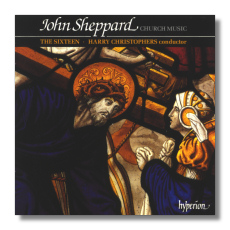
The Internet's Premier Classical Music Source
Related Links
- Latest Reviews
- More Reviews
-
By Composer
-
Collections
DVD & Blu-ray
Books
Concert Reviews
Articles/Interviews
Software
Audio
Search Amazon
Recommended Links
Site News
 CD Review
CD Review
John Sheppard

Responds and Hymns
- Verbum caro factum est
- Laudem dicite Deo
- Reges Tharsis et insulae
- In manus tuas Domine
- Filiae Hierusalem venite
- In pace in idipsum
- Paschal Kyrie
- Haec dies quam fecit Dominus
- Spritus sanctus procedens
- Justi in perpetuum vivent
- Libera nos, salva nos
The Sixteen/Harry Christophers
Hyperion CDA66259
Even regular listeners to Renaissance music may not have heard of the Tudor composer John Sheppard. To a large extent, he, along with Tye, has stood in the shadow of Tallis, Byrd, Weelkes, and Taverner. Not many manuscripts have survived and, of those, few until recently were in print. Like the later Weelkes (who may have learned from him), Sheppard favors rich textures with five, six, and even seven voices, as well as simultaneous soundings of major and minor thirds and of major and minor sevenths (known as the "English cadence"). Nevertheless, most of the works recorded here don't really offer a fair test of him as a composer. More than most works, Sheppard designed them to function in a service, rather than as an "artistic" set. Individually beautiful, together they tend to blur together, particularly since Sheppard resorts to many of the same contrapuntal tropes. One notes especially a downward stepwise run as a point of imitation after a climax. It's a beautiful backoff, but it's the same backoff in so many of these pieces.
The number of superb British chamber choirs continues to astonish me. The cathedral and university network has much to do with this embarrassment of riches, of course, but even so, many have managed to cultivate individual approaches to the English choral tradition. The Sixteen, for example, don't sound like the Tallis Scholars who in turn don't sound like King's College. Harry Christophers's Sixteen put out a lot of sound, and they really are sixteen singers. Their textures are clear, good for exposing the counterpoint of Renaissance music. The singers know when to giveth and when to giveth way. The tone, however, is a bit hard – this is not a sound to snuggle in – and the dynamic range seems a bit restricted. This comes mostly from the women's parts – no vibrato and a fair amount of "push" in the voice. The Tallis Scholars, in comparison, are almost lush (and some criticise them because of it). The Sixteen do very well, but I think Christopers made a programming mistake. Most of the variety in the music appears mainly to experts. He would have done better to give us one of the masses (*not* the "Western Wynde") to break things up.
The recorded sound evokes big spaces and the brightness of tone on stone, without muddying the streams of music from the choir.
Copyright © 1996, Steve Schwartz


















